- Home
- Mack Reynolds
Trojan Orbit Page 3
Trojan Orbit Read online
Page 3
Suvorov took another sampling of his food, another swig of the strong beer. “I stopped off for a sausage,” he said.
The colonel nodded. “For my purpose, it is possibly even better. One can never be sure. Wherever you might be, in Vienna, there is always the possibility that the imperialist spies might be monitoring your conversations.”
Suvorov grunted contempt of that. “Who in the espionage world, East or West, would be interested in the words of a biologist?”
The other said, still respectfully, “They might not be interested in your words, Comrade, but they most certainly would be in mine.”
The biologist took another pull at his beer and said sarcastically, “You seem to have delusions of grandeur, Colonel.”
The colonel shook his head. He caught the waitress’s eye, pointed to Suvorov’s beer mug, and held up two fingers. She beamed back at him and took off for the order.
He said, “Tell me, Comrade, have you much interest in the space program?”
“Which one? That of the West, the so-called Lagrange Five Islands, or our own space platforms?”
“Both.”
“Why, I suppose I have the normal interest. I follow the news. The capitalist world seems to be in a frenzy of enthusiasm over Doctor Ryan’s project, but…”
The colonel demurred a little. “It’s beginning to wane a bit,” he said.
“…but our own seems to go more slowly,” Suvorov finished.
“But more surely,” the colonel said.
The two fresh steins of beer arrived just in time. The food-loving scientist had drained his first liter. While he had the waitress, he ordered another sausage.
“You should really try one of these,” Suvorov said. “We haven’t the like in Moscow, or anywhere else for that matter.”
“All right,” the colonel said. “Thank you.”
“I didn’t offer to buy it,” Suvorov said ungraciously. “Put it on your expense account. I still don’t like the Cheka.”
The colonel pretended to chuckle, as though a joke was meant. “All things change, Comrade,” he said. “I doubt if I would have approved of the organization at the time of your illustrious grandfather’s trouble.”
“What’s this about the space programs?”
Dzhurayev took a swallow of his beer and nodded approval. “The Czech pivo has always been superior,” he said. Then he leaned forward. “From the first, the space programs of the Soviet complex and of the West have differed. Not in goals, since we both have realized since the nineteen-seventies that the domination of space will ultimately mean the domination of Earth itself, but in the method utilized to achieve such domination.”
Suvorov raised his eyebrows skeptically and took another pull at his stein.
The other nodded again, this time with emphasis. “Ultimately, the conquest of space will mean unlimited solar power to replace depleted fossil fuels. Ultimately, it will mean all but unlimited supplies of raw materials, now nearing exhaustion on Earth. Ultimately, it will mean manufacturing under circumstances far superior to those prevailing on Earth.”
“Perhaps there is room for both East and West in space. There would seem to be a great deal of it.”
The colonel didn’t accept that. He said, “In which case, the world revolution that we look forward to might never transpire. If the capitalist system is given a reviving shot in the arm, such as would be brought about by the successful exploitation of space, we might never see the day when communism prevails.”
Suvorov began, “I fail to see what…”
But the Cheka man went on. “Early in the game, the Americans, then working alone, concentrated their efforts on reaching the moon, seeking to regain their lost prestige when we launched Sputnik One. With the advent of Solomon Ryan’s revolutionary project to build a space island at Lagrange Five, utilizing Luna raw materials, all of their efforts were devoted to this end. Hundreds of billions of dollars have now been plowed into it. Their basic idea is ultimately to build satellite Solar Power Stations, or SPS’s to beam microwave power to receiving stations on Earth.”
“We’ve spent a few hundred billion rubles ourselves,” the biologist said mildly.
“Yes,” the other said. “But on an entirely different approach. In actuality, the Yankees and the balance of the West have been fools in directing all of their efforts toward the moon and their island space colony. We have concentrated instead on building space platforms. Module by module, they continue to grow, but we do not attempt to use Luna raw materials for their construction. Our modules are prefabricated on Earth and rocketed up to geosynchronous orbit. Already, our people there are at work building space tugs and space barges, preparatory to heading out to the asteroids. We are stealing a march on Ryan and his colleagues. And eventually this will lead to our triumph.”
Suvorov wasn’t sure he had gotten that. He said, “How do you mean?”
The colonel was emphatic. “I mean that the moon is comparatively barren and worthless. Yes, it has oxygen, silicon, calcium, titanium, aluminum, and magnesium, but in forms fairly expensive to extract, as the Lagrange Five Corporation is discovering. The moon also has gravity—one-sixth that of Earth, but gravity. And it must be fought to get the raw materials from Luna to Lagrange Five and the island being constructed there. But the asteroids are ninety percent carbonaceous chondritic and not only have all the metals boasted by the moon but are rich in hydrogen, carbon, and nitrogen, all of which must be brought up from Earth for the moon base and the construction of Island One. In actuality, the Lagrange Five Project is a farce. Ultimately, perhaps, such islands will be practical, but at this point we have insufficient scientific knowledge to build a successful one. When such is built, it will be Soviet, not Western, and the materials will come largely from the asteroids.”
“Are you so sure that Ryan’s Island One is doomed to failure?” the academician murmured. “There is certainly a great enthusiasm for it.”
“All our experts say that it is doomed. They are pouring their hundreds of billions down the drain into what is sometimes called a gigantic boondoggle, because they are so blinded by their high hopes. Practically none of the basic ideas with which they started have worked. Their moon-based mass driver has never become really operational. They’ve wound up smelting moon ores on Luna and sending them to Lagrange Five by space tug. Their smelters in space are driving their technicians out of their minds. Their closed-cycle ecology in the island has them stumped. But you, of course, know more about that than I. What is your opinion, Comrade Academician?”
The biologist took another swig of his beer and looked thoughtful. “I have been following their efforts, to the extent that they are published,” he admitted. “And the problems of maintaining complex artificial ecosystems within the capsule are far from solved. The microorganisms necessary for the nitrogen cycle, and the diverse organisms involved in decay food chains must be established, as must be a variety of other microorganisms necessary to the flourishing of some plants. Unwanted microorganisms would inevitably be included with, or would evolve from, desirable ones purposely introduced. Furthermore, in many cases, the appropriate desirable organisms for introduction are not even known to us. Whatever type of system they are currently trying to introduce, there would almost certainly be serious problems with its stability. They have their work cut out for them, as the Americanism has it.”
The other was gratified. “Their whole scheme revolves about their being able to establish a closed-cycle ecology. If they can’t, then the project is doomed. They’d have to bring air, food, and water up all the way from Earth for their 10,000 population.”
The biologist shrugged and considered ordering still another sausage. He decided against, it, though, and signaled the waitress again for one last stein of the dark beer.
He said, “Perhaps in time such a system will be possible. For the present, we have insufficient data. I would say that in this particular field of science, we of the Soviet complex are in advance of
the Americans, Japanese, and Western Europeans. Perhaps by the time our own space program, utilizing materials from the asteroid belt, as you say, is ready to build a similar island, we will have solved the problems involved. But I fail to see, Comrade Colonel, what all this has to do with me and the here and now. I am on my way to an international bionomics conference in Vienna. In fact, I am scheduled to read a paper on ecology tomorrow.”
Colonel Vladimir Dzhurayev leaned back and said softly, “Tomorrow, in Vienna, you will announce to the news media that you have defected. You will request political asylum of the United States. Upon arrival there, you will contact the Lagrange Five Corporation and offer your services to the Lagrange Five Project.”
The biologist’s face had gone slowly pale. “Are you mad?” he whispered.
“The Party requests this of you, Comrade Suvorov.”
Leonard Suvorov said, an indignant rasp in his voice, “Colonel, I am a member of the Academy of Sciences, possibly the most prestigious scientific body in the world. There are less than two hundred of us, with perhaps three hundred candidate members. I am a Nobel Laureate and I also bear the Hero’s Award of Soviet Science. I am not a spy or a saboteur!”
The colonel took a deep breath, but waited until the girl had served their two fresh mugs of beer and had gone again to reply.
He said evenly, “You are not being sent to Island One of the Lagrange Five Project as a saboteur, Comrade Academician. You are being sent to apply your best effort to their problems in establishing a closed-cycle colony.”
The eminent scientist could only stare.
The colonel took up his beer, swallowed deeply, and set the mug down. He said, “Interest in the Western countries has been flagging, so far as the Lagrange Five Project is concerned. The financial drain has been unbelievable. Investors in the Corporation are beginning to have second thoughts. The program is years behind schedule. All phases of the operation seem to be going wrong. You are the most prominent ecologist in the world. Your joining the project will give rise to new hopes.”
“But why?”
“It is really quite simple. We do not want the Lagrange Five Project to fail—as yet. We want it to continue. It is doomed to collapse, but the longer it continues the harder it will fall when it inevitably does. Tens of millions of investors in the Lagrange Five Corporation have put their savings into the promise of space. When the final collapse takes place, there will be disillusionment beyond any that has ever been known. Far beyond that of Vietnam and Watergate combined. No Western power or combination of powers will be willing to mount further space programs on such a scale for many years. Certainly not one of the magnitude of penetrating to the asteroid belt and exploiting it. The Soviet complex will be left alone in the field.”
“It’s diabolical!”
“Comrade Suvorov, you are a loyal and devoted member of the Party. Your father before you was the same. Your grandfather is a national hero. The Fatherland of the Proletariat is at a crossroads. If we can dominate space, milk it of its solar power and raw materials, we have triumphed and capitalism has failed. The Party calls upon you, Comrade Leonard Suvorov.”
The older man sank back into his chair, unbelieving. “Ai, ai, my wife, my children,” he whispered.
“Comrade Olga Suvorov is a Party member. She will be let in on the secret. It is a very well kept secret. Only a handful will be aware of the true nature of your defection. The children are too young to be trusted with it. They will have to bear up under the unfortunate pressures that will undoubtedly be released upon them, particularly from their contemporaries, when it is revealed that you have become a traitor. When all this is through, you will return to your country and recant. Much publicity will be given to the fact that you have rejected the West, after witnessing its shortcomings. You will be received with open arms by both the nation you love and by your family. Number One himself will greet you in the Kremlin and issue you a newly created, special decoration.”
“I see,” the scientist said weakly. “And you say my instructions are to cooperate wholeheartedly with my colleagues of the West in their efforts to maintain an artificial ecosystem in their Island One. But suppose that I am successful?”
“You won’t be,” said the other cynically. “But even if you are it will make no difference. There are too many, ah, bugs in the project. It’s doomed to failure. At most you might prolong its life a fraction. And that is to our advantage, as I have pointed out.” He paused before adding, “There is another aspect of your assignment. Undoubtedly, due to your prominence in the scientific world, you will be made privy to the innermost decisions made by Dr. Solomon Ryan and his closest associates. Possibly you will learn of matters that should be relayed to us. One of our KGB moles, located on Island One, will contact you upon your arrival.”
The colonel snapped his fingers at the waitress for their bill.
Chapter Three
“We will also need human institutions devoted to enforcing the rules and regulations. We will take our police forces, security forces, and military I naval forces into space with us. Initially, they may well be like Pinkerton men. They may be the company guard force. In any event, they will be there to enforce, by physical force if necessary, the property rights of the corporations, individuals, or nations involved in space industry... The security groups of the Third Industrial Revolution will also be an interesting human institution to watch develop. They may begin as private groups. Or as mercenaries...”
—G. Harry Stein,
The Third Industrial Revolution.
*
Roy Thomas entered the small room tucked to one side of the famed Oval Office. He was looking thoughtful and displeased.
The expression was far from rare on the face of the man who had been the alter ego of three consecutive presidents. In his early fifties, Roy Thomas was a painfully thin man, gaunt of face, weary of eye, ulcer-prone, and sour. He dressed with a scorn for fashion befitting a man who gave not a single damn what others thought of his appearance. He gave not a damn about that or about anything else others might think about him, including his boss, if boss he could be called. Thomas was little-known outside government, and even in it, only by the highest echelons. He never talked to the media. The American in the street would have to think twice to even remember his name, and then it would be to recall, vaguely, that he had something to do with being a presidential assistant, or something like that. He bore no specific title.
Gertrude Steiner, the gray-haired, middle-aged, veteran presidential secretary, looked up from her desk and awarded him a harried smile. She flicked off the phone screen she’d been talking into and said, “Good morning, Mr. Thomas.”
“Good morning,” he told her. “Is the chief available?”
“It’s his half-hour of morning meditation.” She knew very well that the other was aware of this. Nothing short of a Hot Line message from the Kremlin was to interrupt the President during his half-hour of meditation. In actuality, it wasn’t the first time that Roy Thomas had ignored this sacred cow.
“Right,” he said. “We won’t be interrupted.”
In disapproving resignation, she flicked on her interoffice screen and spoke into it, apology in her voice. “Mr. Thomas requests to see you, Mr. President.” And then, tight-lipped, “Yes, sir, I told him.”
She looked up at the Chief Executive’s one-man think tank, with continuing disapproval. “Very well, Mr. Thomas.”
He was already on his way to the door that opened on the Oval Office.
Behind the huge desk, the Chief Executive of the United States of the Americas had pushed his chair back and was staring expressionlessly at the floor. He said aloud, but not as though to anyone in particular, “You can still see the holes made by his golf shoes. He must have been the only president in history to have made a permanent mark in the White House.”
Roy Thomas took one of the heavy leather chairs, saying, “There have been alterations, additions, and reconstructions by various incu
mbents, including Truman.”
“That’s not the same thing,” President Paul Corcoran said testily, moving his chair back nearer to the desk.
Roy Thomas looked at his superior and wondered how long it had been since the country had had a competent president. Roosevelt? He had been a consummate politician and, as chief executive, had at least the ability to surround himself with able aides. The fact that he was senile toward the end was beside the point. Hoover had probably been the better man, but he’d had the luck of the Irish to take office when he did. Still, in those days government had been another thing. Today, it was an impossibility for a single man to handle the job of chief executive. It wound up being an office more similar to the monarchy of Great Britain than to that once held by such as Lincoln. A chief of state, but a figurehead. Tri-Di and TV image was more important these days than brains and executive ability. And you couldn’t fault Paul Corcoran there. Had he gone into show business rather than politics in his youth, he would have now been making more money than he was as the supposed leader of the nation.
“What was it, Roy?” the President said.
Roy Thomas nodded, and the unhappy expression returned to his gaunt face. He said, “I’ve been mulling over various odds and ends for some time. I want to pry into them further, Paul.”
“One of your famous intuitive premonitions?”
His closest aide was impatient of that way of putting it but he said, “Something like that.”
The President sighed inwardly. He hoped that it wasn’t anything similar to Thomas’s discovery that the agnostic vote had grown beyond that of the fundamentalists and that it behooved the chief executive not to drop so many mentions in his talks of the powers above. Paul Corcoran hated anything controversial, particularly anything as controversial as religion. He had a gut feeling that almost anything you said on such subjects lost you votes.
He said, “Well, out with it, Roy. What’s roaching you now?”

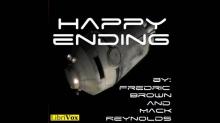 Happy Ending
Happy Ending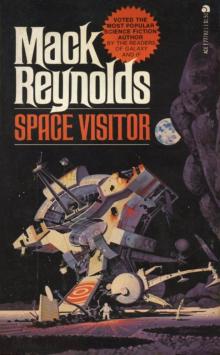 Space Visitor
Space Visitor A Kiss Before Loving
A Kiss Before Loving Episode on the Riviera
Episode on the Riviera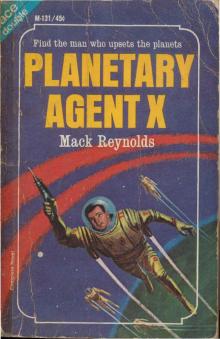 Planetary Agent X
Planetary Agent X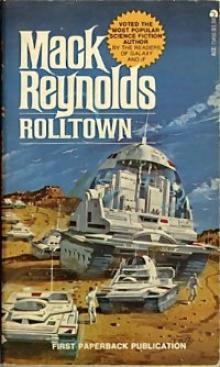 Rolltown bh-3
Rolltown bh-3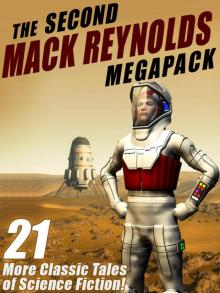 The Second Mack Reynolds Megapack
The Second Mack Reynolds Megapack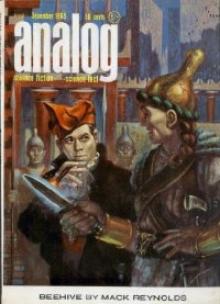 Dawnman Planet up-2
Dawnman Planet up-2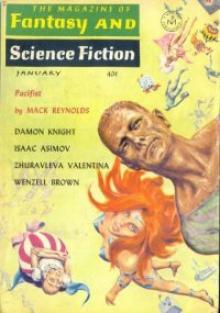 Pacifist
Pacifist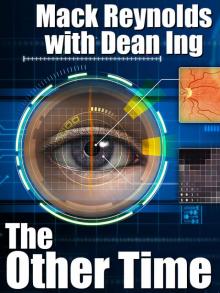 The Other Time
The Other Time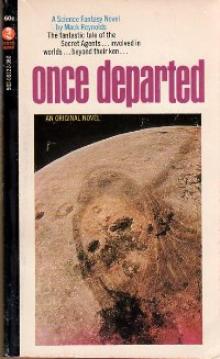 Once Departed
Once Departed IQ
IQ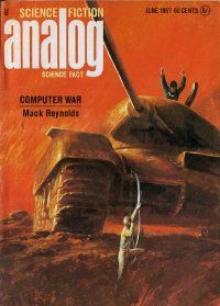 Computer War
Computer War Earth Unaware
Earth Unaware The Rival Rigelians up-3
The Rival Rigelians up-3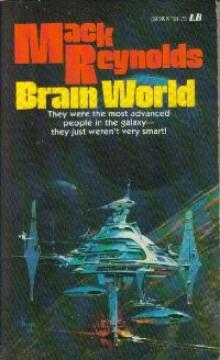 Brain World up-7
Brain World up-7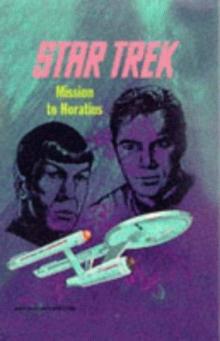 Star Trek - TOS - Mission to Horatius
Star Trek - TOS - Mission to Horatius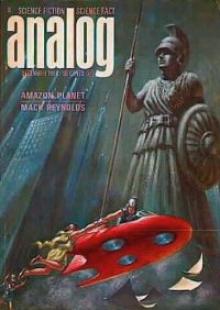 Amazon Planet up-5
Amazon Planet up-5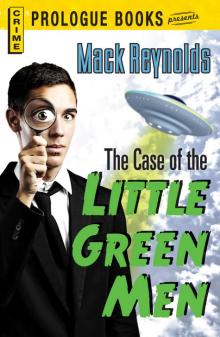 The Case of the Little Green Men
The Case of the Little Green Men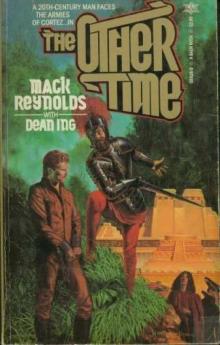 Other Time
Other Time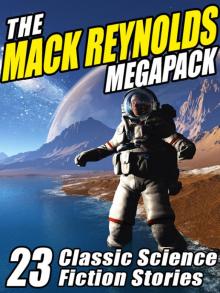 The Mack Reynolds Megapack
The Mack Reynolds Megapack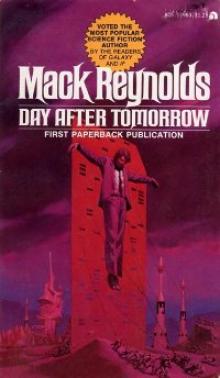 Day After Tomorrow
Day After Tomorrow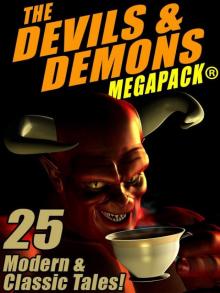 The Devils & Demons MEGAPACK ®: 25 Modern and Classic Tales
The Devils & Demons MEGAPACK ®: 25 Modern and Classic Tales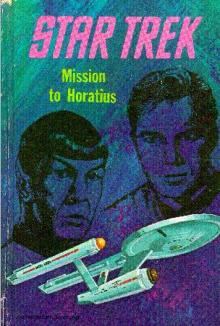 Mission to Horatius
Mission to Horatius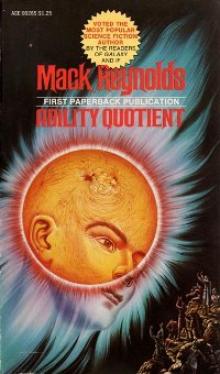 Ability Quotient
Ability Quotient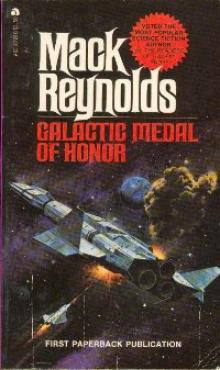 Galactic Medal of Honor
Galactic Medal of Honor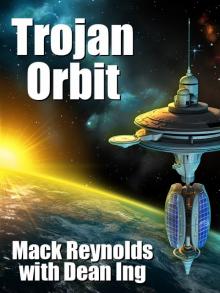 Trojan Orbit
Trojan Orbit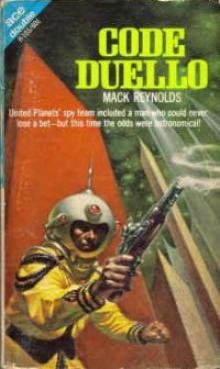 Code Duello up-4
Code Duello up-4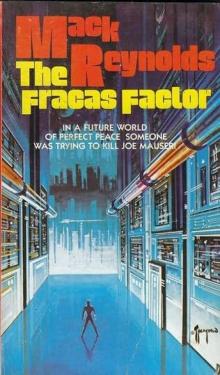 The Fracas Factor
The Fracas Factor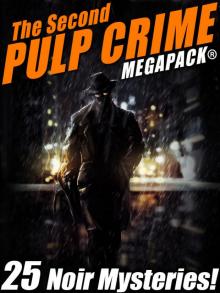 The Second Pulp Crime
The Second Pulp Crime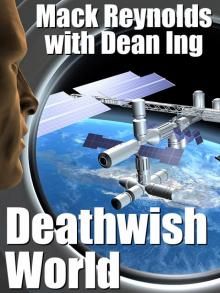 Deathwish World
Deathwish World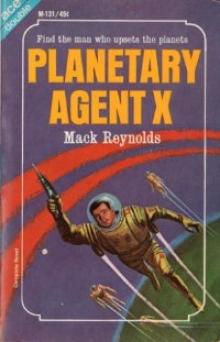 Planetary Agent X up-1
Planetary Agent X up-1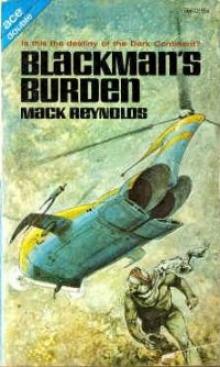 Blackman' Burden na-1
Blackman' Burden na-1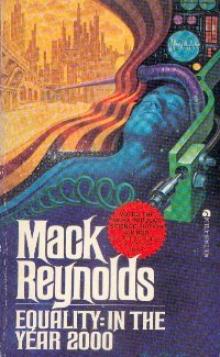 Equality: In the Year 2000 jw-2
Equality: In the Year 2000 jw-2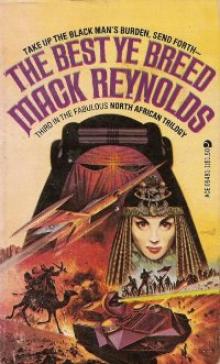 The Best Ye Breed na-3
The Best Ye Breed na-3 The Jet Set
The Jet Set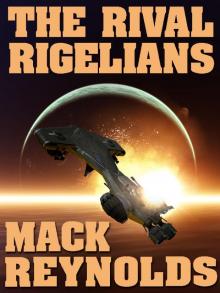 The Rival Rigelians
The Rival Rigelians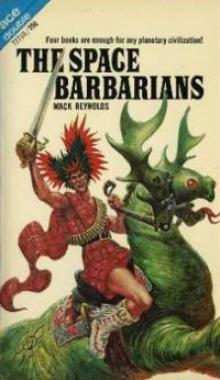 The Space Barbarians
The Space Barbarians